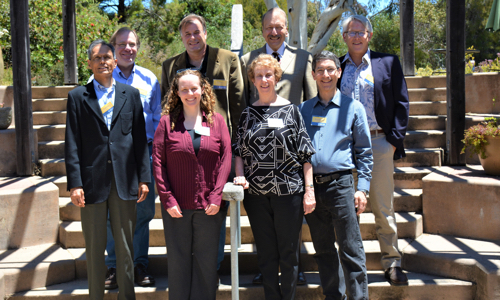Seven UC Santa Cruz faculty members were recognized for their extraordinary commitment to teaching.
Chancellor George Blumenthal presented this year’s Excellence in Teaching awards, one of the highest campus honors faculty members can receive, during a June 14 reception at the Arboretum. The seven recipients were selected by the Academic Senate’s Committee on Teaching from more than 500 nominations.
Blumenthal said that a focus on excellent teaching is a distinguishing characteristic of UC Santa Cruz. He noted several themes that emerged in the teaching philosophies written by each recipient, including an interest in using technology to improve the classroom experience, selecting authors with a diversity of voices, and a desire to help underrepresented students succeed.
“Your willingness to do those things is partly what sets you apart,” Blumenthal said. “Across the board, you bring caring, passion, talent, and commitment to teaching.”
The winners of the Excellence in Teaching Award for 2017 are:
Subhas Desa
Senior lecturer in technology management
A theme emerges when colleagues talk about Subhas Desa’s teaching: a deep commitment to the long-term welfare of students. Desa searches for ways to accommodate students so they can graduate on time, even if it means extra work for him or another faculty member.
But he is also known in the Technology Management Department for offering demanding classes. Department Chair Brent Haddad wrote that no matter how hard he makes the classes he teaches, students will say, “Well, it was hard, but not as hard as a Desa class.”
Students nearly universally heap praise on Subhas’s teaching, calling it amazing, enthusiastic, committed, and genius.
Andrew Fisher
Professor in Earth and planetary sciences
Andrew Fisher, a hydrogeologist, has a simple goal as an instructor—that his students will want to learn more on a subject when the class is done because they gain both understanding and enthusiasm. But succeeding is not simple.
Creating and delivering ideas and information that satisfy this aspiration is an ongoing challenge—but one at which Fisher succeeds.
“Every homework set or lab exercise or presentation should have a narrative arc, with a coherent through-line of ideas, methods and messages, arranged to tell a story" Fisher wrote in his teaching philosophy. “Course components should be part of a larger and more complex narrative, kind of like a collection of linked short stories that address broad themes, forming a sort of novel.”
Baldo Marinovic
Lecturer in ecology, evolutionary biology
By the number of students he has taught, the breadth of his teaching, the content of his courses, Baldo Marinovic is perhaps the most important instructor in Ecology and Evolutionary Biology, department chair Ingrid M. Parker wrote in nominating him.
Since his appointment, Marinovic has taught 12 different courses, to majors and nonmajors, including both lower- and upper-division courses.
Student note that his lectures are entertaining, organized, demanding, rigorous, and rewarding. His teaching style is diverse and allows for different types of learning in the classroom. He mixes use of the whiteboard, PowerPoint presentations, and field lectures.
Leta Miller
Professor of music
Leta Miller is one of the most engaging, dynamic, and rigorous teachers in the Arts Division. She cares deeply about her students and is committed to maximizing their learning.
Miller has long set the standard for excellence in the Music Department, according to department chair Dard Neuman. Though she has taught for decades, Miller always adjusts her courses, incorporating new material, new technologies, and new feedback, as well as her new research.
Students note that she is demanding yet caring.
Ruth Murray-Clay
Professor of astrophysics
Ruth Murray-Clay is the recipient of the Ron Ruby Teaching Award in Physical & Biological Sciences Division. She an outspoken advocate for women in science, working tirelessly to fight against the sexual harassment of female scientists from senior male colleagues.
She has also dedicated herself to the needs of those who have had less educational support and opportunities, making her an outstanding mentor to undergraduate and graduate students, shaping them as both as people and researchers.
As a result, Murray-Clay’s students are commonly awarded top postdoctoral positions as well as faculty positions in some of the most highly regarded programs in the world. She overhauled a core graduate class to reflect the fast-moving research areas of planetary and galaxy dynamics. Department chair Enrico Ramirez-Ruiz said her evaluations for the class the best he’s ever seen as chair.
Kiva Silver
Lecturer in the Writing Program (Stevenson College)
Kiva Silver aims to help students improve their writing by transforming their thinking about writing. He also inspires them to think more deeply—more philosophically—about life itself.
His teaching in many ways then embodies the best of what UCSC promises: a humanistic education that transforms students’ thinking about their work and the world.
Silver’s students praise him for his ability to help them develop new ways of writing. They come to understand there is no single correct way to compose an essay and that they have agency as writers. Many students say Kiva helped them to write more “deliberately” and with a heightened sense of purpose.
John Tamkun
Professor in molecular, cell and developmental biology
John Tamkun, a professor in molecular, cell and developmental biology, is an extraordinarily talented and dedicated teacher.
He has long focused with great intensity on improving learning outcomes for undergraduate students in his department and at the campus as a whole.
His recent classroom teaching has been in two courses: undergraduate introductory Molecular and Cell Biology, and graduate Critical Analysis. The introductory class is the department’s most important and difficult course to teach, said department chair Bill Saxton, so it’s taught by the most experienced faculty. It serves students who have proposed/declared a biology major, which is one out of every eight UCSC students.
Tamkum approaches the responsibility of introducing students to the core material of our discipline with energy, enthusiasm, and empathy.



